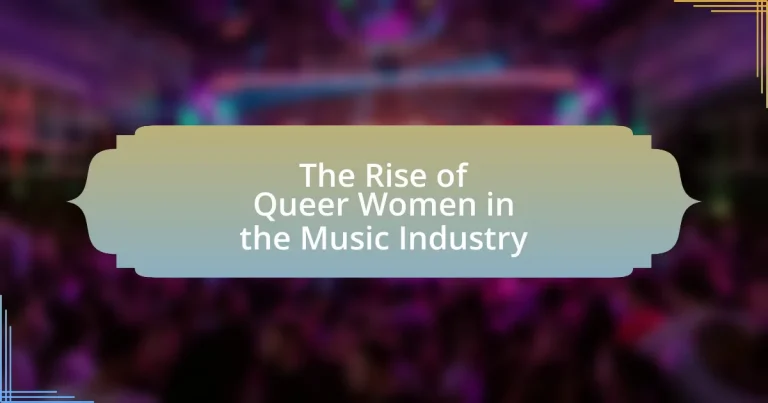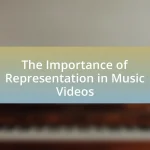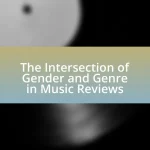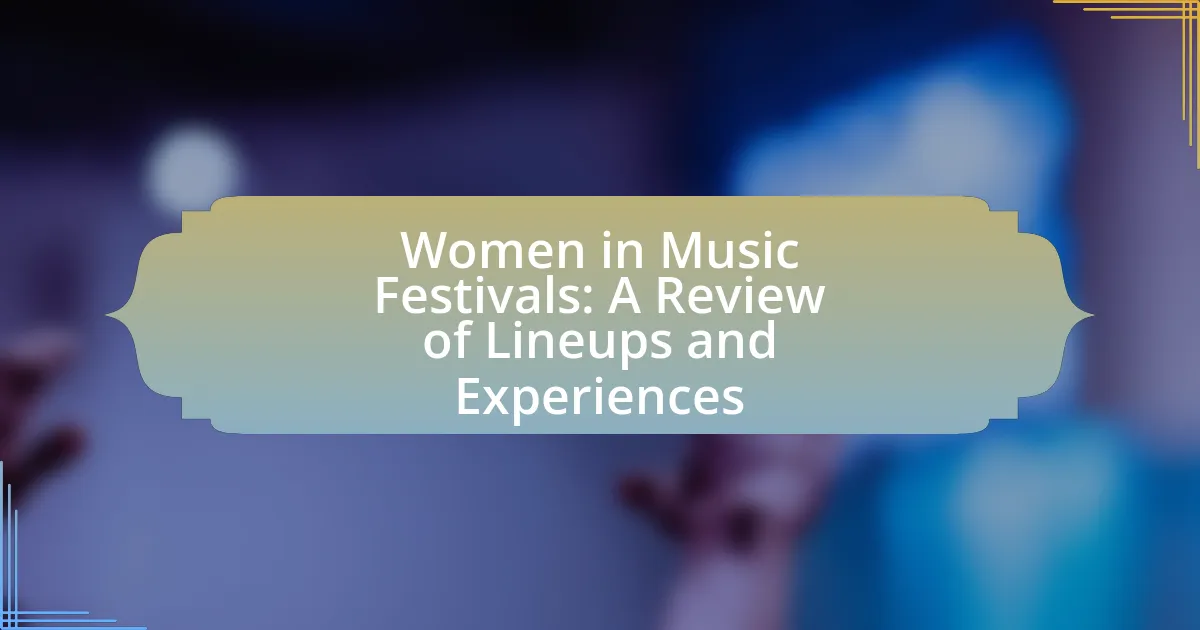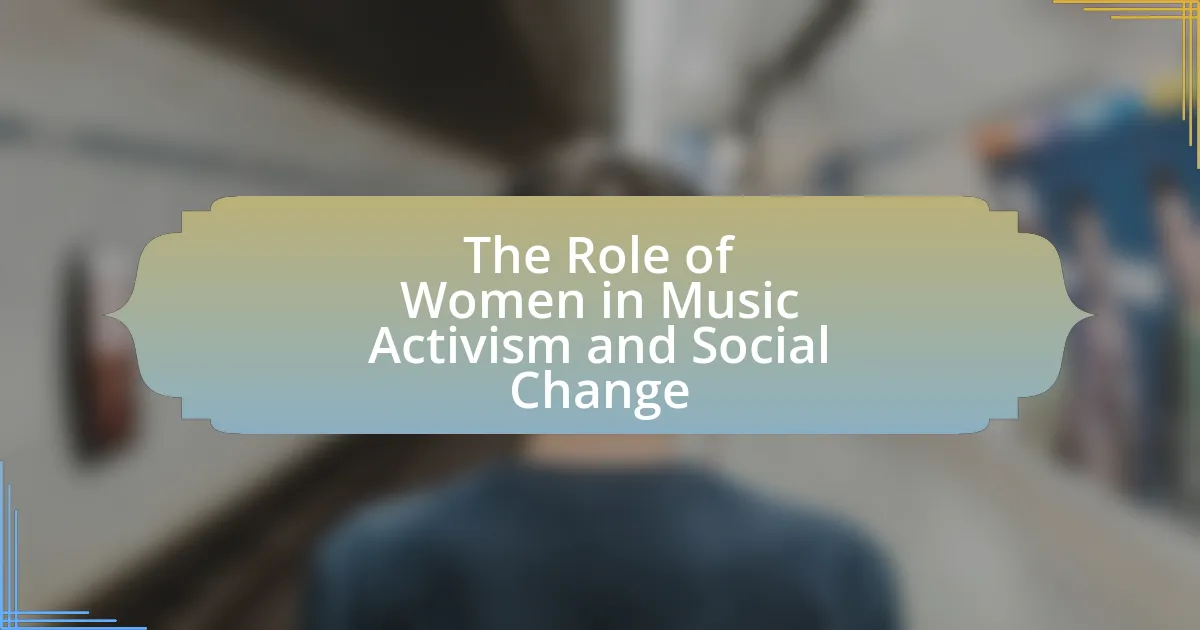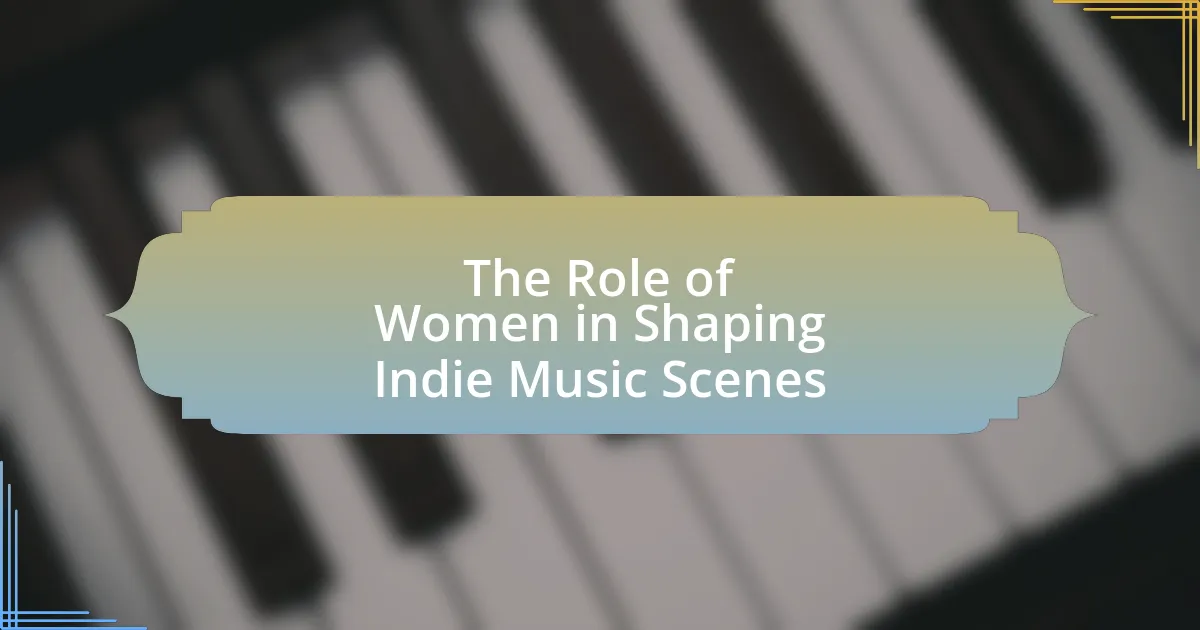The article examines the rise of queer women in the music industry, highlighting factors such as increased visibility, evolving societal attitudes, and supportive networks that have contributed to their success. It discusses how societal acceptance has enhanced representation, allowing artists like Hayley Kiyoko and Janelle Monáe to gain mainstream recognition. The article also addresses the challenges queer women face, including discrimination and industry biases, while exploring the unique perspectives they bring to music creation. Additionally, it outlines the impact of cultural movements, the evolution of LGBTQ+ rights, and the future prospects for queer women in the industry, emphasizing the importance of mentorship and community support in fostering their careers.
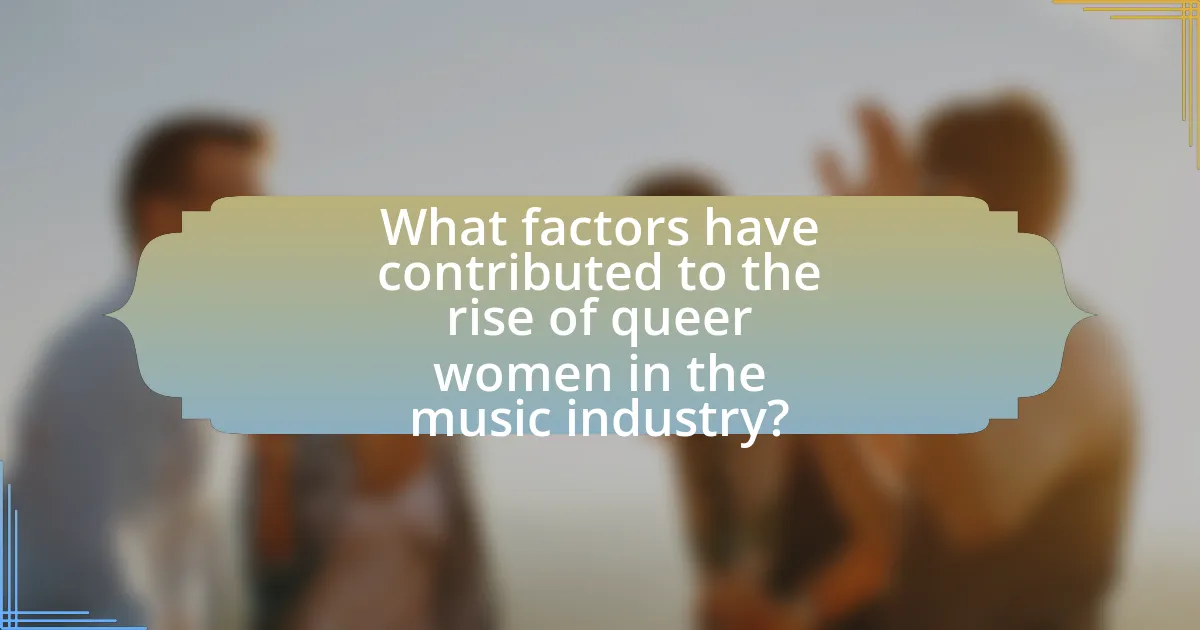
What factors have contributed to the rise of queer women in the music industry?
The rise of queer women in the music industry has been significantly influenced by increased visibility and representation, evolving societal attitudes, and supportive networks. Increased visibility has been driven by the success of queer artists like Hayley Kiyoko and Janelle Monáe, who openly express their identities in their music, thereby inspiring others. Evolving societal attitudes towards LGBTQ+ communities have fostered a more inclusive environment, allowing queer women to pursue careers in music without as much fear of discrimination. Additionally, supportive networks, such as LGBTQ+ music festivals and organizations, have provided platforms for queer women to showcase their talents, further contributing to their rise in the industry.
How has societal acceptance influenced the visibility of queer women in music?
Societal acceptance has significantly increased the visibility of queer women in music by creating a more inclusive environment that encourages self-expression. As acceptance has grown, artists like Hayley Kiyoko and Janelle Monáe have gained mainstream recognition, reflecting a shift in cultural attitudes. This visibility is supported by data showing that LGBTQ+ representation in media has risen, with a 2021 GLAAD report indicating that 20% of music artists identified as LGBTQ+, compared to just 5% in previous decades. This change has allowed queer women to share their narratives and connect with broader audiences, ultimately transforming the music landscape.
What role do cultural movements play in promoting queer women artists?
Cultural movements play a crucial role in promoting queer women artists by providing visibility, community support, and platforms for expression. These movements, such as the LGBTQ+ rights movement and feminist art movements, create spaces where queer women can share their experiences and artistry without fear of discrimination. For instance, events like Pride festivals and queer art exhibitions showcase the work of queer women, helping to elevate their profiles in the music industry. Additionally, cultural movements often advocate for representation and inclusivity, leading to increased opportunities for queer women artists in mainstream media and music. This support is evidenced by the rise of artists like Hayley Kiyoko and Janelle Monáe, who have gained significant recognition and success partly due to the backing of cultural movements that champion queer identities and narratives.
How has the evolution of LGBTQ+ rights impacted queer women’s representation in music?
The evolution of LGBTQ+ rights has significantly enhanced queer women’s representation in music by fostering a more inclusive environment that allows for diverse voices to be heard. As legal and social acceptance of LGBTQ+ individuals has progressed, particularly since the 1970s, queer women have gained greater visibility and opportunities within the music industry. For instance, the legalization of same-sex marriage in various countries has led to increased representation in mainstream media, allowing artists like Melissa Etheridge and Tegan and Sara to openly express their identities and experiences. This shift has been supported by organizations such as GLAAD, which tracks LGBTQ+ representation in media, highlighting the growing presence of queer women in music charts and festivals. Consequently, the evolution of LGBTQ+ rights has not only empowered queer women to share their stories but has also encouraged the industry to embrace and celebrate their contributions.
What challenges have queer women faced in the music industry?
Queer women have faced significant challenges in the music industry, including discrimination, lack of representation, and barriers to mainstream success. Discrimination manifests in various forms, such as bias from industry gatekeepers and limited access to opportunities compared to their heterosexual counterparts. A study by the University of Southern California’s Annenberg Inclusion Initiative found that only 2.1% of artists on the Billboard Hot 100 from 2012 to 2018 identified as LGBTQ+, highlighting the lack of representation. Additionally, queer women often encounter difficulties in gaining visibility and support from record labels and media outlets, which can hinder their career advancement. These challenges contribute to a music landscape that is often unwelcoming and inequitable for queer women.
How do stereotypes and biases affect the careers of queer women musicians?
Stereotypes and biases significantly hinder the careers of queer women musicians by limiting their opportunities and visibility in the music industry. These musicians often face discrimination based on their sexual orientation, which can lead to fewer performance opportunities, reduced media coverage, and challenges in securing record deals. For instance, a study by the University of Southern California found that LGBTQ+ artists are underrepresented in mainstream music, with only 2% of chart-topping songs featuring queer artists, highlighting the systemic barriers they encounter. Additionally, societal stereotypes about gender and sexuality can result in queer women being pigeonholed into specific genres or roles, further constraining their artistic expression and career growth.
What barriers exist for queer women in gaining mainstream recognition?
Queer women face several barriers in gaining mainstream recognition, including societal stigma, lack of representation, and industry biases. Societal stigma often leads to discrimination and marginalization, making it difficult for queer women to gain visibility. Additionally, the music industry has historically favored heterosexual narratives, resulting in limited opportunities for queer women to showcase their talents. Research indicates that only a small percentage of artists in mainstream music identify as LGBTQ+, highlighting the lack of representation. Furthermore, industry biases can manifest in the form of gatekeeping, where decision-makers may overlook queer women in favor of more conventional artists, thereby hindering their chances for success.
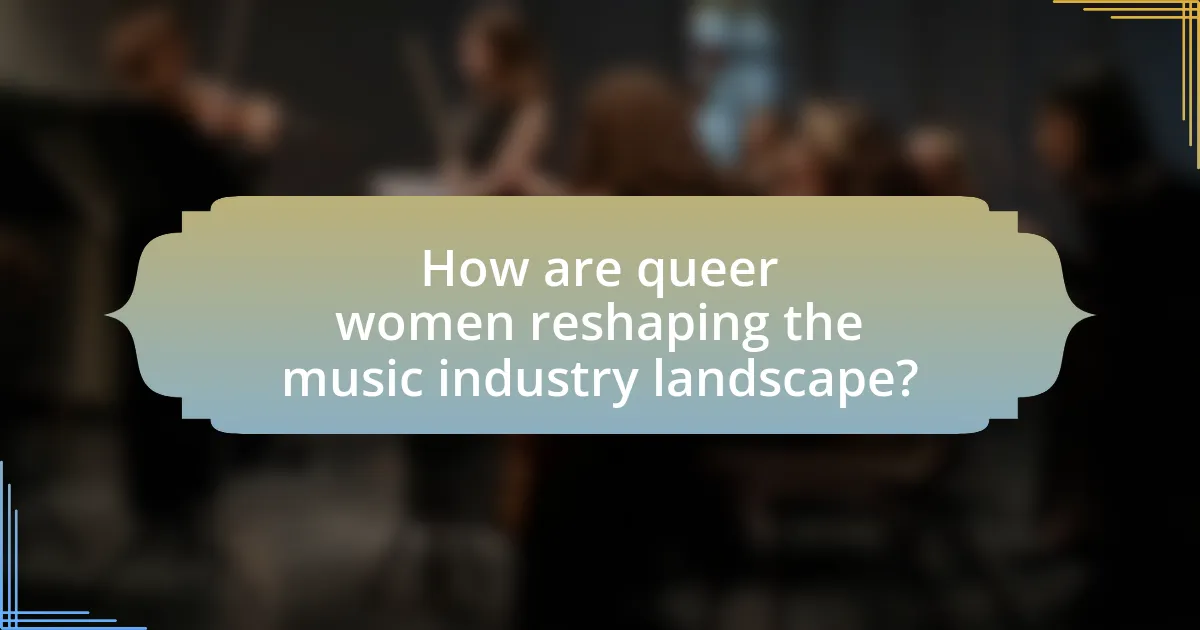
How are queer women reshaping the music industry landscape?
Queer women are reshaping the music industry landscape by increasing visibility and representation, challenging traditional norms, and creating inclusive spaces. Artists like Lil Nas X and Hayley Kiyoko have gained mainstream success, demonstrating that queer narratives resonate with a broad audience. According to a 2021 report by the Annenberg Inclusion Initiative, only 22.5% of artists in the Billboard Hot 100 identified as LGBTQ+, highlighting the need for greater representation. This underrepresentation is being addressed as queer women leverage social media platforms to build communities and promote their work, thus influencing industry trends and encouraging diversity in music genres.
What unique perspectives do queer women bring to music creation?
Queer women bring diverse perspectives to music creation that often reflect their unique experiences of identity, community, and resilience. Their contributions frequently challenge traditional norms and explore themes of love, sexuality, and social justice, which resonate with broader audiences. For instance, artists like Tegan and Sara and Hayley Kiyoko have used their platforms to address LGBTQ+ issues, fostering inclusivity and representation in the music industry. Research indicates that music created by queer women often incorporates elements of intersectionality, allowing for a richer narrative that speaks to both personal and collective experiences. This distinct viewpoint not only enriches the musical landscape but also promotes a deeper understanding of diverse identities within society.
How do queer women artists express their identities through their music?
Queer women artists express their identities through their music by incorporating personal narratives, themes of love and sexuality, and social justice issues into their lyrics and performances. For instance, artists like Hayley Kiyoko and Janelle Monáe openly address their sexual orientation and experiences in their songs, creating a space for visibility and representation. This approach not only resonates with their own experiences but also connects with listeners who share similar identities, fostering a sense of community. Additionally, studies have shown that music serves as a powerful medium for marginalized voices, allowing queer women to challenge societal norms and advocate for LGBTQ+ rights through their artistry.
What themes are prevalent in the music of queer women artists?
Themes prevalent in the music of queer women artists include identity exploration, love and relationships, empowerment, and social justice. These artists often delve into personal narratives that reflect their experiences with sexuality and gender, creating a space for authenticity and vulnerability. For instance, songs frequently address the complexities of queer love, highlighting both the joys and challenges faced in romantic relationships. Additionally, many queer women artists use their platforms to advocate for LGBTQ+ rights and broader social issues, as seen in the works of artists like Hayley Kiyoko and Brandi Carlile, who incorporate themes of activism and resilience into their music. This thematic focus not only resonates with their audience but also contributes to the visibility and representation of queer voices in the music industry.
How are queer women influencing music genres and trends?
Queer women are significantly influencing music genres and trends by introducing diverse perspectives and innovative sounds that challenge traditional norms. Artists like Hayley Kiyoko and Janelle Monáe have reshaped pop and R&B by incorporating themes of sexuality and identity into their music, which resonates with a broader audience. Additionally, the rise of queer women in genres such as indie rock and hip-hop has led to the emergence of new subgenres that blend various musical styles, reflecting their unique experiences. For instance, the success of artists like Lil Nas X, who openly identifies as queer, has not only garnered mainstream attention but has also paved the way for more inclusive narratives in music. This influence is evidenced by the increasing visibility of queer women in award nominations and chart performances, highlighting their role in shaping contemporary music culture.
What impact do queer women have on pop music and mainstream culture?
Queer women significantly influence pop music and mainstream culture by challenging norms and expanding representation. Artists like Lil Nas X and Hayley Kiyoko have brought visibility to LGBTQ+ narratives, reshaping the industry’s landscape. Their music often addresses themes of identity, love, and acceptance, resonating with diverse audiences and fostering inclusivity. For instance, Kiyoko’s song “Girls Like Girls” directly addresses same-sex attraction, contributing to a broader acceptance of queer relationships in popular media. This visibility has led to increased support for LGBTQ+ rights and visibility in mainstream culture, as evidenced by the growing number of queer artists receiving major awards and recognition, such as Sam Smith and Janelle Monáe.
How are queer women artists redefining genre boundaries?
Queer women artists are redefining genre boundaries by blending diverse musical styles and challenging traditional norms within the music industry. For instance, artists like Janelle Monáe and Hayley Kiyoko incorporate elements from pop, R&B, rock, and electronic music, creating hybrid genres that reflect their unique identities and experiences. This genre-blending not only expands the sonic landscape but also promotes inclusivity, as these artists often address themes of sexuality, gender, and identity in their work, resonating with a broader audience. The impact of queer women in music is evident in the increasing visibility and acceptance of non-binary and LGBTQ+ narratives, which have historically been marginalized.
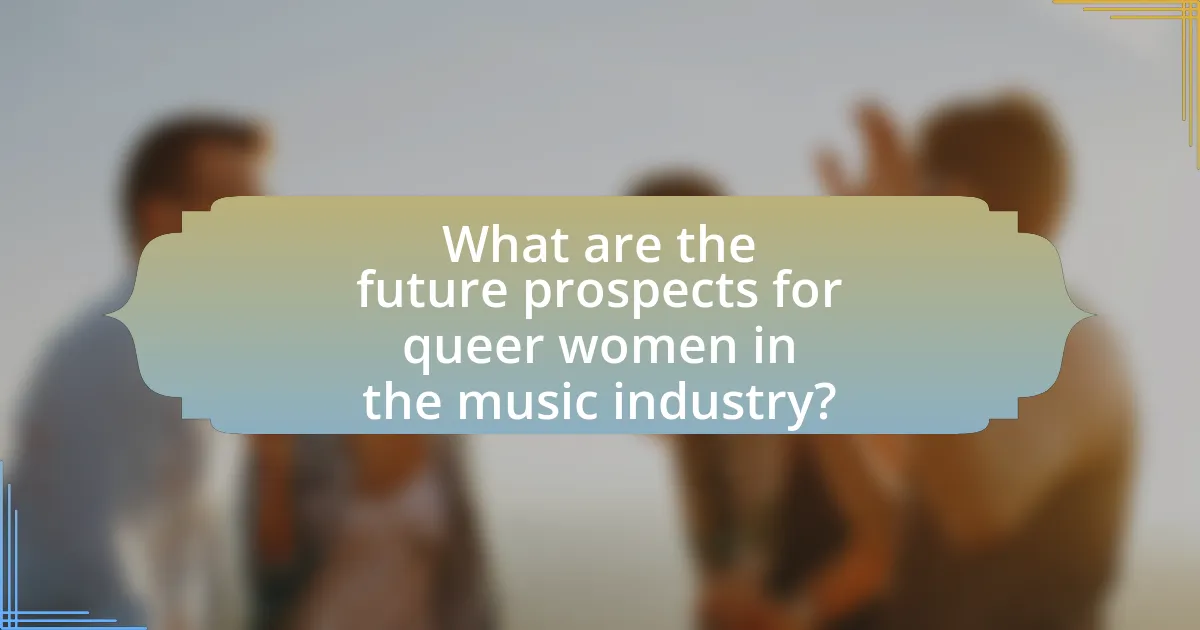
What are the future prospects for queer women in the music industry?
The future prospects for queer women in the music industry are increasingly positive, driven by a growing acceptance and visibility of LGBTQ+ artists. The rise of platforms like TikTok and social media has enabled queer women to reach wider audiences, allowing for greater representation and influence in mainstream music. Additionally, industry initiatives focused on diversity and inclusion are creating more opportunities for queer women, as evidenced by the increasing number of awards and recognition for LGBTQ+ artists, such as the GLAAD Media Awards. This shift reflects a broader cultural change that supports queer narratives and artistry, suggesting that queer women will continue to gain prominence and success in the music industry.
How can the music industry further support queer women artists?
The music industry can further support queer women artists by increasing representation in decision-making roles and providing equitable funding opportunities. Research shows that diverse leadership leads to better outcomes for underrepresented groups; for instance, a study by McKinsey & Company found that companies with more women in leadership positions are 21% more likely to outperform their peers in profitability. Additionally, establishing dedicated grants and mentorship programs specifically for queer women artists can help bridge the funding gap, as data from the National Endowment for the Arts indicates that marginalized artists often face financial barriers that hinder their careers.
What initiatives are being implemented to promote diversity in music?
Initiatives promoting diversity in music include programs like the “Women in Music” organization, which advocates for gender equality and provides resources for women in the industry. Additionally, the “Sisterhood” initiative by the Recording Academy focuses on supporting women and non-binary individuals in music through mentorship and networking opportunities. Research shows that diverse representation in music leads to increased creativity and innovation, highlighting the importance of these initiatives in fostering an inclusive environment.
How can mentorship programs benefit queer women in music?
Mentorship programs can significantly benefit queer women in music by providing guidance, networking opportunities, and support tailored to their unique experiences. These programs often connect queer women with established professionals who can offer insights into navigating the music industry, which has historically been challenging for marginalized groups. Research indicates that mentorship can enhance career development, with a study by the American Psychological Association showing that mentees are more likely to receive promotions and salary increases. Additionally, mentorship fosters a sense of community and belonging, which is crucial for queer women who may face discrimination or isolation in the industry.
What practical steps can aspiring queer women musicians take to succeed?
Aspiring queer women musicians can succeed by actively networking within the LGBTQ+ community and seeking mentorship from established artists. Building connections with other musicians, producers, and industry professionals can provide valuable opportunities and insights. Additionally, participating in LGBTQ+ music festivals and showcases can increase visibility and help in gaining an audience. Research indicates that representation in music positively influences success; for instance, a study by the University of Southern California found that diverse artists often attract broader fan bases. Engaging with social media platforms to share music and personal stories can also enhance reach and foster a supportive community.
How can networking and community building enhance opportunities for queer women in music?
Networking and community building can significantly enhance opportunities for queer women in music by providing access to resources, mentorship, and collaborative projects. These connections facilitate the sharing of knowledge and experiences, which can lead to increased visibility and support within the industry. For instance, organizations like Girls Rock Camp and the Queer Music Heritage Project create safe spaces for queer women to develop their skills and showcase their talents, fostering a sense of belonging and empowerment. Additionally, studies show that diverse networks can lead to more innovative and successful outcomes, as collaboration among individuals with different perspectives often results in unique artistic expressions and broader audience reach.
What resources are available for queer women pursuing music careers?
Queer women pursuing music careers have access to various resources, including organizations, grants, and mentorship programs specifically designed to support their artistic endeavors. Notable organizations such as the Queer Music Heritage and the LGBTQ+ Musicians Network provide networking opportunities, educational resources, and community support. Additionally, grants like the Transgender Artist Fund and the Queer Artist Fund offer financial assistance to help cover costs related to music production and promotion. Mentorship programs, such as those offered by the Women’s Audio Mission, connect queer women with industry professionals who can provide guidance and support in navigating their careers. These resources collectively foster an inclusive environment that empowers queer women in the music industry.
